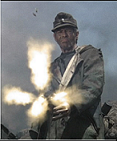Hanny
Posts: 422
Joined: 7/5/2011
Status: offline

|
quote:
ORIGINAL: Capt. Harlock
150 Years Ago Today:
The second part of Lincoln's proclamation after Fort Sumter now came into effect: a special session of Congress. To pay for the war, among other things, he knew that extraordinary measures would have to be passed, and so he had chosen an emotionally powerful date. He gave a speech to urge the emergency legislation, (though he left out the suspension of the writ of habeas corpus), for once referring to himself in the third person, and concluding:
Not so, all done without Congress in session.
Lincoln on those measures.
"These measures, whether strictly legal or not, were ventured upon under what appeared to be a popular demand and public necessity, trusting then as now that Congress would readily ratify them."
In his 8 April 1864 letter to Albert G. Hodges, an attorney from Frankfurt, Kentucky, he expressed the same sentiment: "I felt that measures, otherwise unconstitutional, might become lawful by becoming indispensable to the preservation of the Constitution through the preservation of the Union."
quote:
This is essentially a People's contest. On the side of the Union, it is a struggle for maintaining in the world, that form, and substance of government, whose leading object is, to elevate the condition of men---to lift artificial weights from all shoulders---to clear the paths of laudable pursuit for all---to afford all, an unfettered start, and a fair chance, in the race of life. Yielding to partial, and temporary departures, from necessity, this is the leading object of the government for whose existence we contend.
Constitution authorises no such thing for POTUS to perform.
Lincoln
"Every man thinks he has a right to live and every government thinks it has a right to live. Every man when driven to the wall by a murderous assailant will override all laws to protect himself, and this is called the great right of self-defense. So every government, when driven to the wall by a rebellion, will trample down a constitution before it will allow itself to be destroyed. This may not be constitutional law, but it is fact."
Lincoln
Let every American, every lover of liberty, every well-wisher to his posterity, swear by the blood of the Revolution never to violate in the least particular the laws of the country, and never to tolerate their violation by others. As the patriots of '76 did to the support of the Declaration of Independence, and so to the support of the Constitution and laws, let every American pledge his life, his property, and his sacred honor — let every man remember that to violate the law is to trample on the blood of his fathers, and to tear the charter of his own and children's liberty. Let reverence for the laws be breathed by every American mother to the lisping babe that prattles on her lap; let it be taught in schools, in seminaries, and in colleges; let it be written in primers, in spelling books, and in almanacs; let it be preached from the pulpit, proclaimed in legislative halls, and enforced in courts of justice. And, in short, let it become the political religion of the nation.
quote:
[...]
He desires to preserve the government, that it may be administered for all, as it was administered by the men who made it. Loyal citizens everywhere, have the right to claim this of their government; and the government has no right to withhold, or neglect it. It is not perceived that, in giving it, there is any coercion, any conquest, or any subjugation, in any just sense of those terms.
Government was not being threatened, membership of the Union was the issue, and the men who made it had just secccded from the Articles of Confederation and before that secedded from the UK Crown. Loyal citizens of what?, each state had citizens who as citizens of that state pwed that state fealty and obiediance in law, no US Citizen existed without first beinga citizen of a state. New loyalty oaths were brought in in late 61, and only 90k of the states citizens who fought would post war agree to take them.
Lincoln
Indiana State legislature on 12 February 1861: "What is 'invasion'? Would the marching of an army into South Carolina, without the consent of her people, and with hostile intent toward them be 'invasion'? I certainly think it would, and it would be 'coercion' also if South Carolinians were forced to submit.
quote:
It was with the deepest regret that the Executive found the duty of employing the war-power, in defence of the government, forced upon him. He could but perform this duty, or surrender the existence of the government. No compromise, by public servants, could, in this case, be a cure; not that compromises are not often proper, but that no popular government can long survive a marked precedent, that those who carry an election, can only save the government from immediate destruction, by giving up the main point, upon which the people gave the election. The people themselves, and not their servants, can safely reverse their own deliberate decisions. As a private citizen, the Executive could not have consented that these institutions shall perish; much less could he, in betrayal of so vast, and so sacred a trust, as these free people had confided to him. He felt that he had no moral right to shrink; nor even to count the chances of his own life, in what might follow. In full view of his great responsibility, he has, so far, done what he has deemed his duty. You will now, according to your own judgment, perform yours. He sincerely hopes that your views, and your action, may so accord with his, as to assure all faithful citizens, who have been disturbed in their rights, of a certain, and speedy restoration to them, under the Constitution, and the laws.
War powers no one else had ever found or used, and the US AG Black advised the outgowing POTUS he could not use as they did not exist to be used for coercion.
Post war they were all denied to POTUS and a a real War Powers act intead introduced.
"These rebels are violating the Constitution to destroy the Union; I will violate the Constitution if necessary, to save the Union; and I suspect, Chase, that our Constitution is going to have a rough time of it before we get done with this row."
quote:
And having thus chosen our course, without guile, and with pure purpose, let us renew our trust in God, and go forward without fear, and with manly hearts.
Lincoln was of course forgetting he had directed Scott to prepare to hold and retake all federal property lost, as soon as he took office.
Lincoln 12 December 1860
"Please present my respects to the general, and tell him, confidentially, I shall be obliged to him to be as well prepared as he can to either hold or retake the forts, as the case may require, at and after the inauguration."
< Message edited by Hanny -- 7/14/2011 6:39:08 PM >
|
 Printable Version
Printable Version
















 New Messages
New Messages No New Messages
No New Messages Hot Topic w/ New Messages
Hot Topic w/ New Messages Hot Topic w/o New Messages
Hot Topic w/o New Messages Locked w/ New Messages
Locked w/ New Messages Locked w/o New Messages
Locked w/o New Messages Post New Thread
Post New Thread